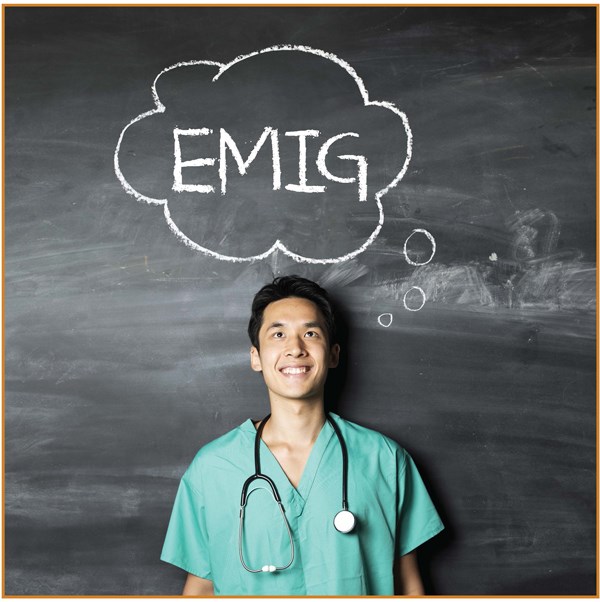Joshua Feblowitz, MS, MSIV, Former EMIG President, Harvard Medical School, Boston, MA
The contributions of emergency medicine residents and faculty members to their local emergency medicine interest group (EMIG) can provide medical students with a valuable introduction to the specialty. Early experiences working with EM physicians through an EMIG can be one of the most important factors in a student's decision to pursue a career in our field. There are a number of great ways to become involved and help engage the next generation of EM physicians.
Get students involved early
At many medical schools, students aren't exposed to EM until their fourth year, when the residency application process is already in motion. This can make it much more challenging for students to consider emergency medicine as a potential specialty. By offering mentoring and shadowing opportunities, as well as volunteering for skills workshops and lectures, residents and faculty give students critical insight into the clinical and research opportunities available to EM practitioners. Events hosted by an EMIG are often a student's first introduction to the specialty and initial point of contact with EM physicians.
Volunteer a unique skill set
Introduce students to the potential career paths in EM by sharing an area of research, subspecialty interest, or clinical skill. My school's EMIG has held a wide array of events, including panels on pediatrics, toxicology, and sports medicine; talks on international work in Haiti, disaster medicine, and wilderness medicine training; workshops on EKGs, splinting, and ultrasound; and even a day-long regional EM symposium. By showcasing the wide variety of options available in the field, these events help to attract students who might not have otherwise considered the specialty.
Teach fundamental clinical skills
Practical skills workshops and simulation sessions are helpful for all medical students, especially those still deciding on a specialty. Workshops introduce students to fundamental skill sets like suturing, intubation, IV placement, and ultrasound. Likewise, simulation sessions help students integrate clinical skills and understand the practice environment of the emergency department. The involvement of experienced residents is essential for making these events a success. By volunteering time through the local EMIG to facilitate workshops and simulation sessions, residents offer students a window into the specialty and also enrich their experience in third-year clinical clerkships.
Connect with students through a mentoring program
Participating in a one-on-one mentoring program is another great way for residents to help those interested in potentially matching in EM. A mentoring program allows students to gain exposure to the specialty early on through shadowing. In addition, having a resident mentor who is close to the application process is critical when the time comes for a student to apply in EM. Matching students with designated resident mentors gives them an approachable contact within the EM community; these connections can often grow into mutually beneficial collaborations and friendships.
Become a faculty advisor
Although emergency medicine is a rapidly growing specialty, the number of students matching per class remains relatively small compared to specialties such as internal medicine and surgery. In addition, as a younger specialty, emergency medicine may not have as many faculty in medical school advising positions.
As a result, students may find it comparatively more challenging to reach out and connect with EM faculty. By becoming involved in the medical school community as advisors, faculty can provide a valuable resource to students, teaching them about the clinical practice environment, directing them towards research opportunities, and modeling the varied career paths available to physicians in the field.
Lead an EMIG
One of the most significant contributions a resident or faculty member can make is to serve as the primary advisor to an EMIG. An EMIG advisor acts as a crucial point of contact for students involved in the group and assists in planning events, securing speakers, recruiting residents for talks, organizing skills workshops and mentoring programs, and connecting students with faculty for research opportunities and advising. EMIG advisors also act as a resource for students by providing advice on careers, fellowship options, and the residency application and interview process. Those physicians who have the commitment to teaching and the time to devote to being an EMIG advisor will provide students with an incredibly important connection to resources and advice on emergency medicine.
The time and thoughtful guidance that EM residents and faculty give students through participation in EMIGs is invaluable when students are choosing their medical specialty. All emergency medicine physicians should consider becoming involved in some way with their local interest group.
For more information and resources on organizing an EMIG, visit EMRA.org.



